KATHMANDU: The 16th Republic Day is being celebrated across the country today by organizing various programs.
The Day is remembered as a day when the people got their rights in the real sense.
Pushpa Kamal Dahal ‘Prachanda’ who guided the 10-year People’s War for establishing the republic, inclusive state system, proportional representation, secularism and other political rights, is the Executive Head of the country at present.
RSS Chief Editor Yek Raj Pathak and Reporter Ramesh Lamsal had a tete-a-tete with PM Dahal.
Excerpts:
We marked the 16th Republic Day today. Some people have been raising multitude of issues as an option to the Republic. What message do you have as a person who led the struggle and movement for the establishment of the Republic and as a leader of the People’s War as well?
The side supporting the unitary feudalist state system of the past and opposed to the republic has started that sort of some efforts. They have only tried to create the environment.
I want to clarify that this is not the question raised from the people’s level. The political leadership, primarily the forces that are the agents of the political change, and leaders and the parties, have to certainly make some evaluation.
The kind of change the people had expected from the federal democratic republic has not been fulfilled in that form.
Therefore, it is the weakness of the political leadership not being able to carry out works as per the people’s aspiration that is the reason for the elements that has been left behind by history, defeated and thrown in the dustbin of history is once again trying to raise its head.
So, all the political parties, the civil society and the agents of the present change should centre on providing good governance, justice and prosperity to the general public, along with serious self-reflection.
What kind of a republic did you envision when you were leading the 10-year People’s War?
Whatever we had conceptualized in course of the People’s War or while declaring the federal democratic republic and the Constituent Assembly coming through the Comprehensive Peace Accord (CPA), has not all been established in the same form because we had envisioned of fully proportional and inclusive rights to the downtrodden sections, ethnic groups, regions and communities under the federal democratic republic.
Economically, we had talked about a people’s economy. We had not talked only of fully proportional system but also of economic revolution.
But as all know at that time we had agreed to go for the Constituent Assembly and a federal democratic republic through the CPA.
That was a historical need at that time. Had we not joined the peace process in a flexible manner at that time entering into an agreement among the political parties, it is terrifying even to think what the situation would have been in the country.
History has proved that we did right by making the political understanding. But, several of our demands were missed out while making agreement in that way and a situation arose in which we had to shelve these demands.
A condition came up in which we had to accept others’ demands. Because of this context, we drafted the Constitution, putting some of our ‘reservations’ at the time of drafting it.
There is a need for amending some of the provisions of the Constitution at present in order to provide better justice to the people and further empowering them.
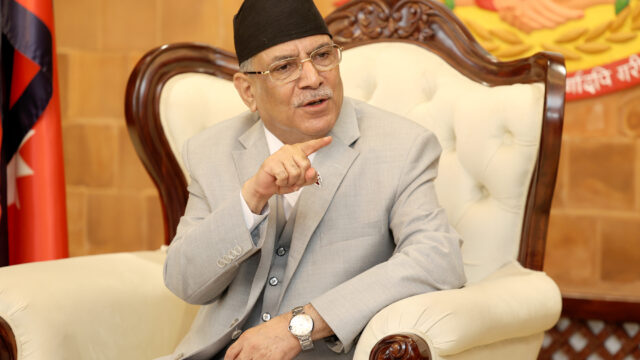
It is necessary to review the election system as well. The election system is more costly, extravagant and beyond the reach of the common man.
It has been felt by all. Regarding the form of government also it is necessary to think of establishing a directly-elected Executive Head. Corruption and anomalies are piling up.
A serious step is needed to remove this. I have moved ahead with a new resolve to establishing social justice and good governance, taking cognizance of my responsibility as one of the leaders of the sweeping political changes that we have brought.
How do you, as the leader of the people’s war and the actor in the peace process, recall the moments of handshaking with the then Prime Minister Girija Prasad Koirala at the then Birendra International Convention Centre, and you now holding the post of government head yourself third time and how do you assess these two dissimilar moments?
When I think back to political developments over the course of 16 years, I found some incidents significant and historic.
Some accomplishments have been possible amidst this time frame. We realised some severe weaknesses as well.
The Comprehensive Peace Accord was itself a historic phenomenon. The Constituent Assembly election led to the announcement of Nepal as a federal democratic republic.
This is itself a matter of a great importance. We successfully concluded the peace process task which was itself a highly sensitive one.
The management of arms and people’s liberation army was a tough nut to crack. We have global histories about the recurrence of violence in the aftermath of the declaration of peace and the occurrences of massive bloodsheds.
But we experienced no such unwanted subsequence situation following the signing of the agreement.
That was of obviously exceptional. But now some people are trying to normalise the accomplishments. Attempts to generalize such developments are capable of distorting the truths of the time.
The comparative analysis of the health, education, economic and infrastructure situations before the country entering into the republic and the now shows that the indicators are positive.
People’s status has significantly improved. The facts should not be twisted. The reality is that we achieve a noticeable progress over the course of the time.
On the other hand, the Constitution that was promulgated by the Constituent Assembly has guaranteed citizens’ right to education, health and employment as their fundamental rights.
It has protected the rights of the suppressed communities. It takes time to draft laws and acts as demanded by the Constitution thereafter.
Formulations of required laws are a must to implement the federal democratic republic. But sill some acts and laws are yet to come.
The federalism is yet to serve the people to the fullest.
The formulation of acts as per the distribution of power powers among the three-tier government: local, province and federal made by the Construction is still awaited and this has prevented the federalism to deliver best results.
Being based on the above mentioned, some are busy about spreading propaganda over the essence of federalism which is absolutely wrong and misleading.
By analyzing the current scenario, I am committed to facilitating to draft the Federal Civil Service Act, Police Adjustment Act, Federal Education Act and to ensure facilities to the people as per the spirit of federalism.
I am determined that these thing should happen during my term at the Office of the Prime Minister to prove that the system itself not a faulty, the people who are responsible for its implementation failed to deliver effectively, leaving a room to doubt over the essence of the system.
The Prime Minister, you are in the Premiership post for the third time of your political career and you have assured the people of visible results with taking their issues into consideration. Do you believe do such works have begun? If yes, what about the progress?
This is apt interrogation. During my first premiership, I was less experienced as the head of the government.
I had still revolutionary sentiments as I had a fresh revolutionary background. The romanticization of such feeling ended in my exit from the post.
If I did not romanticize the revolutionary thought, there was no doubt that I would remain on the post for the full five-term. Our party was the largest and most powerful party of the time.
But the psychology to idolize the situation overly was my weakness. In history, I would say we had to make Girija Prasad Koirala the President of Nepal.
If this happened, the things might unfold differently. The Constitution would be drafted on time and the conclusion of the peace process would be easier.
My intention was to defeat the wrong practices. But always intention does not work. I learnt to realize that polices, plans and programmes should be objective.
The second term went with a bit experiences, but it was still channeling. Some significant outputs were recorded in the short span of time.
I set an example to promote unity among mountains, hills and the Terai, promoting the culture of consensus and implementing it.
You addressed the parliament session with some sorts of statements like ‘have you ever seen a Prime Minister like me, I would quit when asked for, but the parliament is not letting me quit.’ Can you explain it?
I got the opportunity to become a Prime Minister for the third time. It is not on the back of the strength of my party; it was the need of the country, and it is out of my experience and people’s trust in our political agenda.
I have been saying from the beginning that there were both opportunities and challenges.
Since the very beginning, I am determined not to let any shortcomings and errors take place, and not to allow anyone to engage in any bad work and activities.
I have also promised to stay away from any such work and activities. You can see, there were disappointments, complaints and dissatisfactions everywhere when I took office as PM.
Efforts are afoot to spread disgust of established political parties and leaders, and create chaos in the country.
But, I from the very beginning have been at work to remove hurdles surfaced in service delivery.
The government has carried out work on the issue of driver’s licence, passport distribution, economic improvements through coordination between the private and public sectors, covering Nepali migrant workers by the social security fund and making available textbooks to students across the country on time.
This time, I tried to synchronise between the monetary policy and fiscal policy.
There have been efforts to decrease bank interest rate, and increase revenue and remittance.
There were reports about horrifying economy. But, the economic situation is horrifying. There are still problems. But, there is hope that these problems can be sorted out.
I have broken past ‘settings’ in many areas. I have broken ‘settings’ worth millions of rupees.
I have taken initiatives to mend things for people. I have gone out of way to control anomalies surfaced in the money laundering and revenue.
In course of this, the government has taken stern steps in controlling corruption. Especially, the fake Bhutanese refugee scam has surfaced. I have taken this as an opportunity to drive the country towards good governance.
This has been successful as a result of seriousness and commitments showed by the government.
I am satisfied with the activities taking place following the formation of the incumbent government. Many things have changes thus far. I was elected as Prime Minister from a coalition.
I am trying to reach a national consensus of a sort as the PM from now another alliance.
There is a need to cut through challenges standing in the face of the country. Now, we are moving on the right path.
A section of people may be restless. Some people do not like the way the leadership commits and takes strong steps to bring disciplines, development activities and prosperity in the country.
They have been trying to hatch conspiracies under various pretexts. When I was elected PM for the first time, I would tell that I would do good things until my tenure, I would try my best to deliver so people can feel; people would deliver a verdict if I was removed from the post despite delivering.
I am telling so even now. I do good work, only good work. People will deliver a verdict if there are any conspiracies being hatched against me. Now, the government and people have come together.
There is uniformity in the way the government is thinking and delivering and people’s wishes.
There is a responsibility to strengthen this. Media holds the responsibility to bring this to the people.
You are on the eve of your visit to India. What are the agendas for the visit?
Discussions on the agendas are taking place between both the countries. Preparations are underway.
What are our expectations from the visit is that I have felt that initiatives are taking place on the part of both sides with wishes that some good decisions may take place for the national interest and the mutual interests between both Nepal and India.
There are some issues about reaching the memorandum of understanding on energy.
We will take up some issues relating to the long-term electricity trade, which will prove far-sighted importance for Nepal.
This is what Nepali people have been seeking for long. We have felt that big investments may not come in when energy production does not get the market as required.
My hope and expectation is that this time, these problems would be resolved, and we will have positive environment for Nepal’s energy trade with other countries.
We Nepali people have been wishing that an environment conducive should be created for a tripartite energy trade among Nepal, India and Bangladesh.
As of now, a theoretical agreement has taken place in this regard. A theoretical agreement has been signed for Nepal to trade around 50 megawatts electricity to Bangladesh through India.
We will move a step closer during this visit to India. I feel this may be a big achievement for Nepal.
The issue of trade transit with India has remained for three and four years. This will move ahead this time, we believe.
We will raise the issue of the construction of the Dodhara-Chandani dry port. Besides, there are many issues to be raised during my visit.
I believe these issues will be positive and for the national interests of Nepal. Discussions on problems between Nepal and India will take place in a positive way.
There are concerns that what is about the border disputes being raised at the people’s level? What will happen to the Eminent Persons Group report?
We will try to settle these issues through a diplomatic level dialogue.
The issue of air entry routes is coming up. What will be the government’s initiatives on the matter?
We are discussing the issue of air entry routes on a serious note. This time, a positive environment will be created on the issue, it is expected.
However, the decision is yet to take. Discussions during the visit will bring positive results.
Reports have it that the government has not paid its attention on conserving the Chure region. How the government has taken this?
This is exaggeration. A section of people are trying to create a mess by spreading doubts and rumours about the country’s economic developments and prosperity.
There are not any policies and programs to export river materials from the Chure region to India.
Efforts will take place in a new way to conserve the region, according to the report relating to the conservation of the Chure region.
The incumbent government strongly commits to conserve the Chure. Policies and programs have been made keeping in mind the ways to prevent the Tarai from turning into a desert.
But, there are rumours about it. The government aims to conserve the Chure and prevent the Tarai from turning into a desert.
(Yek Raj Pathak and Ramesh Lamsal/RSS)


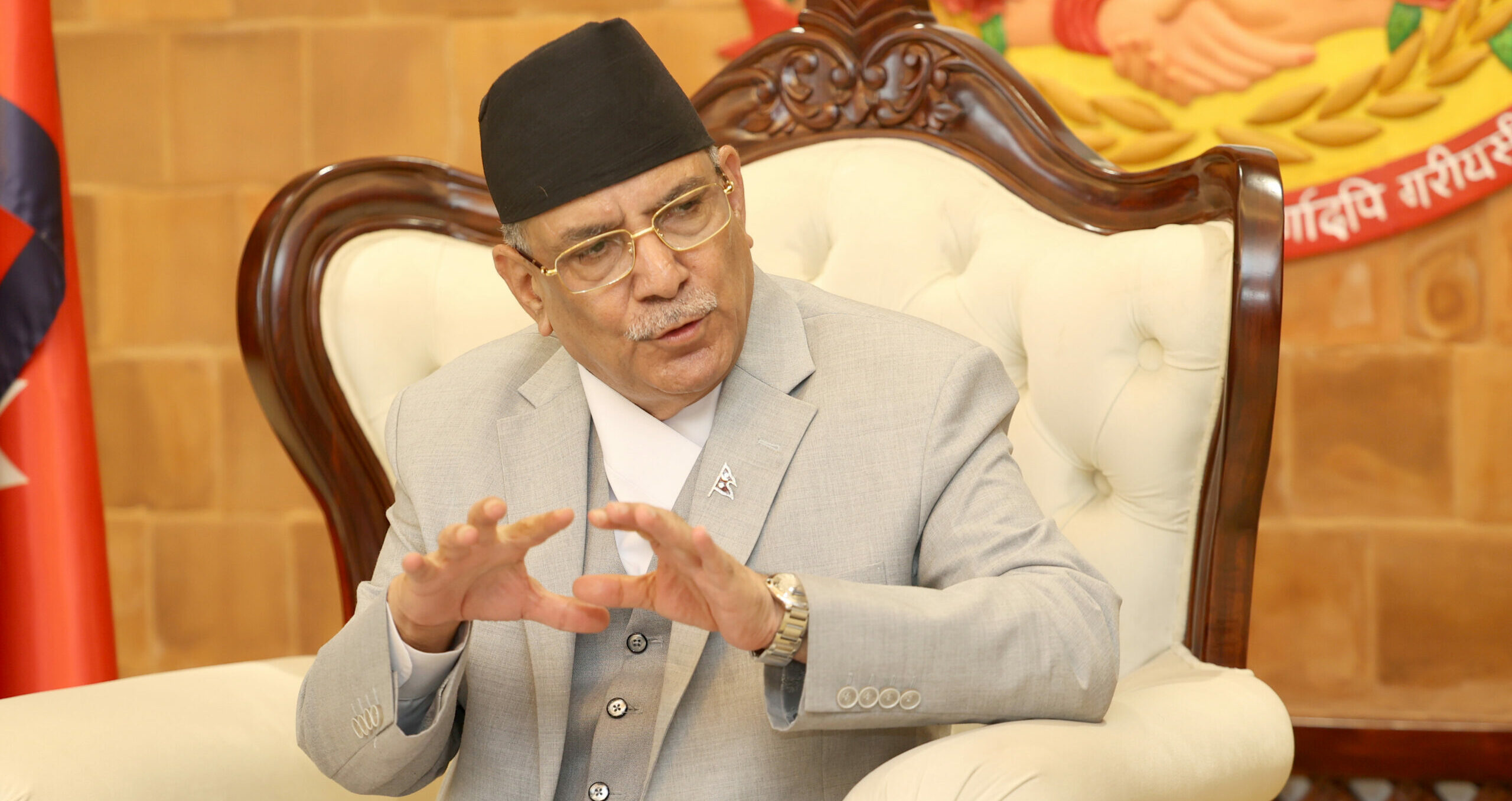

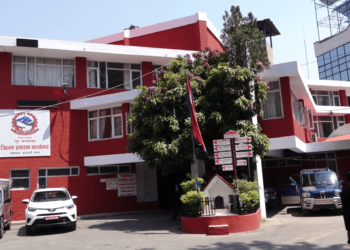
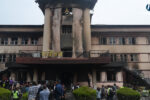

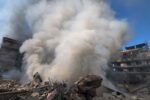

Comment